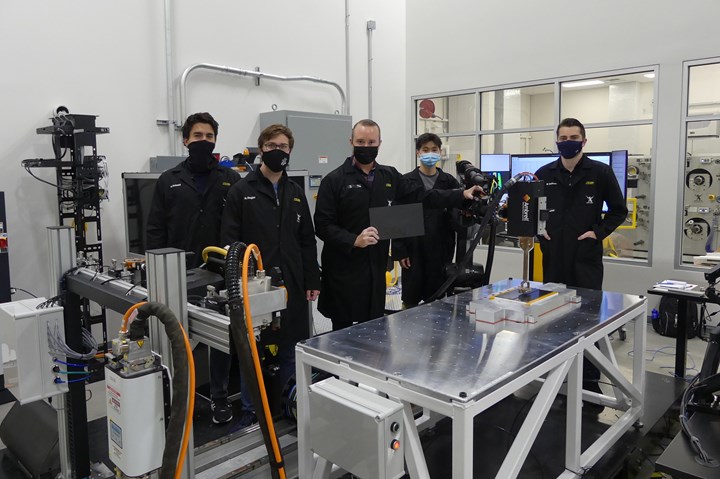WSU-NIAR adds automated TP welding and tape-slitting capabilities to ATLAS facility
Systems to aid in welding process developments for the joining of composite structures via fusion bonding, and support AFP demands.

Photo Credit: WSU-NIAR
Wichita State University’s National Institute for Aviation Research (NIAR, Wichita, Kan., U.S.) has announced the addition of two new technologies to its Automated Technologies Laboratory for Aerospace Systems (ATLAS): a fully integrated thermoplastic welding system and a prepreg tape slitting and tow-rewinding machine.
The new thermoplastic welding (a.k.a. fusion bonding) system features in-process inspections and closed-loop controls for continuous welds using an industrial robot. In addition to induction welding, engineers are developing resistance and ultrasonic welding processes to support joining representative aircraft parts with fusion bonding as an alternative to adhesive bonding or bolted joints. Fusion bonding does not require the rigorous surface preparation steps typically required for adhesive bonding and can be automated to eliminate operator dependency. The modular control system can easily be scaled up to production size.
This system was developed under NIAR’s Modeling for Affordable Sustainable Composites (MASC) research program, sponsored by the Air Force Research Laboratory (AFRL). According to WSU-NIAR, the MASC program is laying framework to enable of the rapid development of automated manufacturing processes for new composite materials and advanced structural concepts; it was provided additional funding back in December 2020 by AFRL to continue advancing this composite research.
“Leveraging the electric conductivity of carbon fibers and principles of electromagnetism, we are able to develop processes to join composite structures while eliminating the need for adhesive joints or fasteners,” says Waruna Seneviratne, ATLAS director and lead scientist for MASC program. “This creates significant weight savings and cost reduction.”
Additionally, Mikrosam (Prilep, Macedonia) and Composite Automation (Cape Coral, Fla., U.S.) have completed installation of a custom single-step composite prepreg tape slitting and tow rewinding unit within NIAR ATLAS. ATLAS also boasts a Cevotec (Munich, Germany) SAMBA Pro Prepreg system.
“With the addition of a Mikrosam slitter to our portfolio of automated manufacturing equipment, we are able to support demand from multiple automated fiber placement [AFP] machines at NIAR — conducting research in a timely manner and supporting our industry partners’ slit-tape material needs,” says Dr. Waruna Seneviratne, ATLAS director. “The integrated in-process inspection system and the machine-learning algorithm for detecting defects allows us to perform quality control on the fly.”
The prepreg slitting equipment from Mikrosam is a single-step process for the slitting of unidirectional (UD) thermoset and thermoplastic prepreg tapes and rewinding them on multiple station traverse winders. The equipment will accommodate slitting for prepreg tapes sizes from 0.25-24.5 inch (6.35-600 millimeters) that rewind on a spool that can be used for AFP. It can also be used for slitting 3-6-inch (75-150-millimeter) tapes on a spool that can be directly used for automated tape laying (ATL) processes.
“NIAR’s ATLAS is the only fully integrated facility that can perform the comprehensive composites manufacturing research that OEMs and tiered suppliers demand in order to reduce risk,” says John Melilli, president of Composite Automation LLC. “Composite Automation is honored to be part of the team.”
Related Content
-
Plant tour: Joby Aviation, Marina, Calif., U.S.
As the advanced air mobility market begins to take shape, market leader Joby Aviation works to industrialize composites manufacturing for its first-generation, composites-intensive, all-electric air taxi.
-
PEEK vs. PEKK vs. PAEK and continuous compression molding
Suppliers of thermoplastics and carbon fiber chime in regarding PEEK vs. PEKK, and now PAEK, as well as in-situ consolidation — the supply chain for thermoplastic tape composites continues to evolve.
-
The potential for thermoplastic composite nacelles
Collins Aerospace draws on global team, decades of experience to demonstrate large, curved AFP and welded structures for the next generation of aircraft.
















